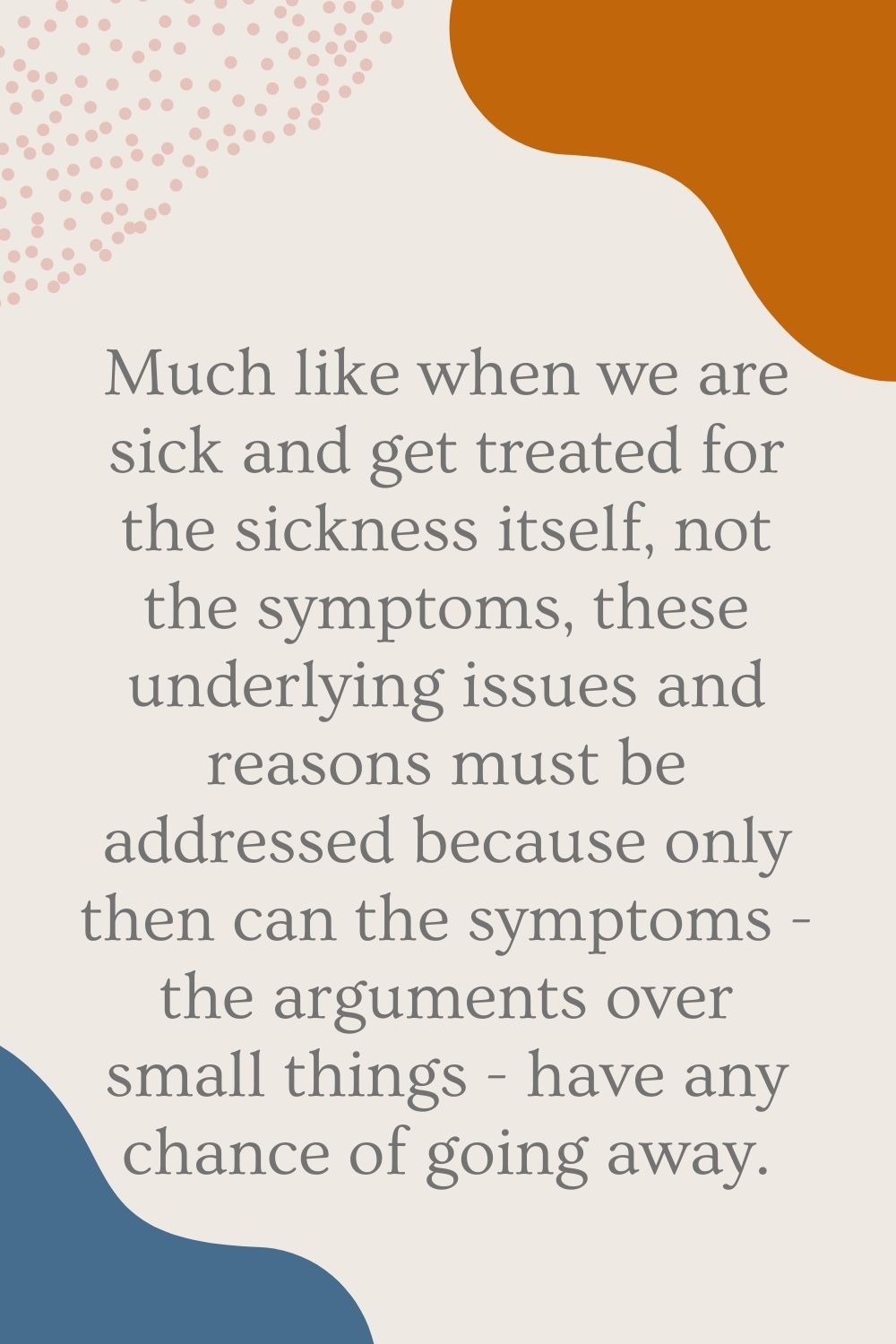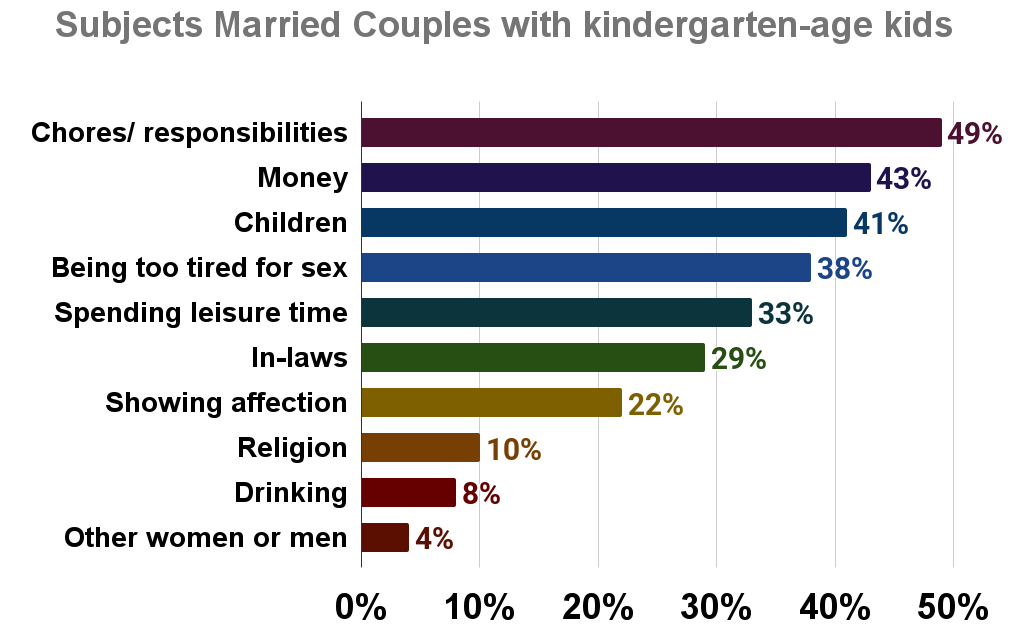Why Couples Argue over the Small Things - 17 Reasons Why and Ways to Overcome It.
WhatToGetMy Instructional Article
- Conflict is bound to happen in relationships because people are fundamentally different.
- What isn’t healthy, however, is this conflict being persistent and over little things, as it could point towards deeper underlying problems in the relationship.
- It is therefore very important that these underlying causes are addressed for the survival of the relationship.
There are several reasons why couples argue over small things which is why it is so common in relationships and marriages.
Arguing over small things might result from certain momentary comments or actions which might make it seem like a temporary thing. When it happens often, however, it represents a pattern and points to deeper reasons and issues which will be escalating with every small fight that results from them.
Much like when we are sick and get treated for the sickness itself, not the symptoms, these underlying issues and reasons must be addressed because only then can the symptoms – the arguments over small things – have any chance of going away.

This article will therefore give insights into why couples keep arguing over nothing and what can be done to fix it.
13 Reasons why couples argue over little things
1. Communication problems
One of the main reasons why couples argue over small things is because they are bad at communicating with each other. Because they don’t know how to talk to each other, situations arise where for instance, one partner trying to get the other to do something comes across to the other one in such a way that they become defensive.
This then leads to the other partner becoming defensive as well which would lead to a fight over nothing that could have been avoided if both partners were good communications.
2. A perceived betrayal
If you find that you are asking yourself, “why are we always arguing?” think back to any incident where either of you felt betrayed by the other. It could be anything as simple as your partner taking your neighbor’s side during an argument about hedge limits to something as serious as infidelity.
Experts say that there is a good chance that this might have created unresolved issues and a feeling of betrayal that has lingered in you such that it comes out at the slightest issue and leads to a fight.
3. Superiority complex
A simple answer to the question, “why do couples argue?” is that one or even either partner has a superiority complex.
Because of this, the partner would always find a way to put the other one down by, for instance, making sarcastic comments or disrespecting the other partner.
Should the partner being put down become defensive, a fight could then ensue as the partner with the superiority complex reacts to this perceived affront to their authority.
4. Anger problems
A person with anger problems might find that they are fighting every day in a relationship because they will get angry over the smallest of things and when they express this anger to the other partner, a fight could ensue.
Because problems with anger are not easily solved, the person would constantly be arguing over nothing because the issue at hand might have been minuscule but because of the anger problems, it was blown out of proportion.
Find out how to stop saying hurtful things when angry.
5. Insecurity
Experts agree that the reason for most petty arguments in relationships is because partners are insecure.
In their insecurity, they take on two roles with one becoming a pursuer and the other becoming a withdrawer.
The pursuer might feel as though the other partner is not giving them attention because they are not good enough for them and so will keep picking issues with them solely to get their attention.
The withdrawer would then respond by pulling back because they feel that they cannot live up to the expectations of the other partner.
A cycle then develops where there is constant arguing with the partner because the pursuer would keep pursuing and the withdrawer would keep getting defensive to avoid having to do what the other partner wants to ensure that their perceived inadequacy is not revealed.
6. Perceived neglect of responsibilities
Being in a relationship, especially one as serious as marriage, means that both partners are expected to handle certain responsibilities such as household chores.
If one partner feels as though the other one is leaving all the responsibility for them, this might become a source of contempt that would lead to them always finding ways to bring it up. The other partner might then get defensive and before you know it, another fight has ensued.
7. Sex and Intimacy issues
A fulfilling sex life is very important to the success of any sexual relationship which sex can be a very big contributor to mini fights in a relationship.
Partners could, for instance, have different sex drives which leaves one partner always wanting more. They could also be bad at satisfying the other or, there could be a difference in expectation with one partner expecting kama sutra styles whilst the other is more of a traditionalist.
Whatever the case, resentment might build from a lack of satisfaction. For example, a marriage psychologist we read about when preparing this article, talked about how they dealt with multiple cases where a husband picks fights over nothing because he is sexually frustrated.
8. Defensiveness from perceived attack
It is normal for humans to react to aggression by being aggressive as well. A reason why couples argue over small things, therefore, is because one partner felt the other was being aggressive with them when they spoke to them about a small issue.
This could largely be down to the tone of voice used and the phrasing of the words spoken. Regardless of the reason, the other partner might then react with a harsher tone or words which could then lead to them fighting over the small issue.
9. Stress
Stress in a relationship on either partner can lead to fights over pointless things as the person who is stressed takes their frustrations out on their partner.
There are several reasons for this stress such as work, family or even finances and any of them can turn a well-mannered person into a short-tempered one that finds fault in everything that other people do.
If yo,u therefore, find yourself saying things like, “we always argue recently” or “we keep arguing,” look to see if there are any stressors that are affecting your partner’s life as this might be the reason for the sudden change in their demeanor.
10. Finances
As much as there can be stress over the finances in a relationship, there can also be issues that arise from partners sharing different perspectives on how money should be spent.
This is why arguments about money are one of the most common types of arguments amongst married people as shown by research done by the Institute of Family Studies.

One partner might view the other as being financially irresponsible and because money is needed to buy even small things, arguments might arise when even small amounts need to be spent.
Arguments about money are one of the most heated and can lead to one being spiteful in a relationship which is why a solution needs to be found as soon as possible.
Related: Financial things to do after getting married.
11. Issues with raising the children
A couple with children might often fight as a result of a clash in parenting doctrine as one parent believes they should raise their children one way but the other partner believes in another.
As a result, a situation may arise where they are of different minds about what to do about a small issue that concerns their children. They might react to this by getting into an argument over which direction they should take and because children are always getting into one thing or another, the fighting could be a constant occurrence.
If the source of your arguments with your partner is your children and especially if it is a marriage, you need to find a way to stop fighting with your spouse as a united front is the best strategy to raise children.
12. Jealousy
It is quite possible that a partner could become jealous of the other and their successes in life. If this happens, the jealous partner might increasingly turn to arguments with their partner as a way to express their negative emotions.
This is especially possible if the jealous partner is insecure and has narcissistic tendencies.
If you are more successful than your partner and know them to be insecure, this might be an answer to your question, “why do we always argue?”
Related: How to deal with an insecure man
13. Belief system
There are many stupid things to argue about but one’s belief system is not one of them. This is why people with compatible belief systems must get together so that their belief systems won’t clash.
Partners with different religions, morals, or even political affiliation, tend to see things differently and this can result in them having small fights constantly as a passive-aggressive way to establish their way of life as the dominant one in the relationship.
For instance, one partner could relate a small issue to the inferiority of the other partner’s belief system which would lead to that partner retorting with a jab of their own that would lead to a fight.
4 Ways to stop arguing less
14. Practice self-control
The first lesson on how to stop bickering in a relationship is to practice self-control in situations that could potentially escalate into an argument over something minuscule.
Having self-control will also help you know how to not let things bother you in a relationship. When you feel an argument coming on, you can diffuse the situation by simply refusing to engage.
This will also require you to have a good sense of awareness to feel the argument coming on. Acquiring these skills will not be easy but you can master it with practice.
15. Consider the underlying issues
Another lesson on how to argue less would be to practice some self-introspection to find out the things that trigger you to initiate an argument. Run over the arguments you have had with your partner and isolate your feelings and thoughts just before the argument escalated.
This would help you identify the source of the arguments on your end so that you can then work on it. If however, you are unable to find out the underlying issue on your own, you can always try therapy.
16. Talk to your partner
A very important step in how to not argue in a relationship is to talk it out with your partner. Constantly arguing and bickering in a relationship is not healthy and will lead to the relationship ending.
This cannot change unless you both come to a consensus to do better. You should therefore reach out to your partner so that you both can chart a healthy path forward.
When you both talk, try to avoid sarcastic comments or any tone that might make your partner defensive. Be as empathetic and possible so that you can see things from their perspective then phrase your issues in such a way as not to blame them outrightly.
If things get heated during the talk, you can avoid arguing with your spouse by telling them that you would like to table the discussion for a little while until you both have calmed down. Ensure, however, that you both do come back to the talk.
Related : How to forgive your spouse for past mistakes.
17. Counseling
Going for relationship/ marriage counseling is not a drastic step but a smart one especially when the situation keeps escalating and with therapy being increasingly accessible to people by also being online, getting help is easier than it has ever been.
Therapists are trained to help you know how to stop arguing with your spouse and so they will know the underlying issues to target to help this situation.
It is usually better that you go with your partner for a more effective result. If your partner is refusing to go, however, and you feel as though you are the problem, you can go alone and still get help on how to stop arguing with your husband or wife.
Frequently Asked Questions
1. How do I stop fighting over little things in my relationship?
- Practice self-introspection to find out what the underlying issues causing these arguments are about.
- Practice self-control when you feel an argument is about to come up and avoid replying in anger. Instead, wait till you’ve calmed down to address things.
- Work on your tone and phrasing so as not to make your partner defensive when you talk to them.
- Talk to your partner about what both of you can do to stop arguing so much
- Go for therapy
2. What does it mean when couples argue a lot?
Couples arguing a lot can either be a good thing or a bad thing. It can be a good thing because it shows that the couple still care about themselves enough to want to let each other know how they feel. Arguing is a normal part of a mature relationship but only when it is not done excessively.
Couples arguing a lot becomes a bad thing when it is done so much that it replaces healthy communication. It is also a bad thing if the argument leads to harsh words and abuse being thrown around.
To be frank, arguing a lot can be a sign of a good relationship so long as partners respect each other during the argument and ensure that it does not replace healthy communication.
3. Is it healthy to argue in a relationship every day?
Arguing every day in a relationship is generally not a good sign because it signifies that arguments are now a normal way of communicating in the relationship.
If this is the case then the relationship in all probability has an expiry date. It is important therefore that you take action if you want to save the relationship by having a talk with your partner on a healthier way forward.
All in All…
Arguing in a relationship can be good if it is done with respect as it shows that you are both just trying to move the relationship forward by making it more accommodating for both of you.
But if you find that you are arguing quite frequently and that you both are saying hurtful things, it might be time to ask yourself, “why do we argue so much?” so that you can get to the root cause of the arguments. This might require some introspection and a talk with your partner or it might require therapy.
Whatever the case, it is important that it is taken care of or it could lead to the demise of your relationship.
01 HOUR 21 MINUTES
ESTIMATED TIME DESIGNING AND UPLOADING THIS ARTICLE
10 HOURS 45 MINUTES
ESTIMATED TIME RESEARCHING AND WRITING THIS ARTICLE
You Might Also Like

Cute Ways to Surprise Your Girlfriend on Her Birthday
Cute Ways to Surprise Your Girlfriend on Her Birthday WhatToGetMy Instructional Article If you’re here, that means your girlfriend’s birthday is coming up. Are you nervous? What a silly question, of course you are! We understand completely. Thoughtful, romantic, and cute gifts are not easy

13 Signs Your Soulmate Is about to Enter Your Life
13 Signs Your Soulmate Is about to Enter Your Life WhatToGetMy Instructional Article Soulmates can be platonic, or romantic. For the sake of this article, we are talking about romantic partners who are your soulmate. But what does it mean for a person to be

Creative Ways to Give a Gift to Your Boyfriend That Are Easy And Fast
Creative Ways to Give a Gift to Your Boyfriend That Are Easy And Fast WhatToGetMy Instructional Article Finding creative ways to give a surprise gift to your boyfriend is easy when you’ve just started dating. When you’re several months into the relationship, it’s not so

11 Effects of Living with an Alcoholic Spouse and How to Live with an Alcoholic Spouse.
11 Effects of Living with an Alcoholic Spouse and How to Live with an Alcoholic Spouse. WhatToGetMy Instructional Article Living with an alcoholic husband/wife can be a nightmare for the spouse who is not an alcoholic. It is a rollercoaster of emotions filled mostly with

WEDDING GIFT IDEAS FOR WEALTHY COUPLE
When it comes to finding wedding gift ideas for a wealthy couple, it can seem an impossible task because they will already have everything and if they don’t have something they can just go out and buy it for themselves. Wealthy couples, if they have

11 Signs He Doesn’t Care About Your Feelings
Signs He Doesn’t Care About Your Feelings WhatToGetMy Instructional Article In this article, we discuss the 11 signs you will see when your boyfriend stops caring about your feelings and doesn’t care about the relationship anymore. We also discuss what to do when you feel

9 Signs of Bad Communication in a Relationship
9 Signs of Bad Communication in a Relationship WhatToGetMy Instructional Article A relationship lacking communication or where the girlfriend or boyfriend doesn’t communicate well will not last long. Sound communication in a relationship has several advantages which are listed in this article. Communication issues in

7 Signs She Cheated in the Past – According to Experts
7 Signs She Cheated in the Past – According to Experts WhatToGetMy Instructional Article There are signs she cheated in the past, and you might not know about this. A lot of women often cheat but are afraid of telling or showing their men about

What to Send in a Care Package for a Boyfriend: 33 Gift Ideas
He is far away and you miss him so much; he’s been under the weather for a while and you want to send a ‘get well’ package to him; his birthday is coming up soon and you want to surprise him; your anniversary is in

11 Cute Things to Send to Your Boyfriend in the Mail
You may decide to send someone a gift through the mail as a sentimental gesture or because you are in a long distance relationship and the easiest way to get items to them is through the mail. There are several items that are allowed to


